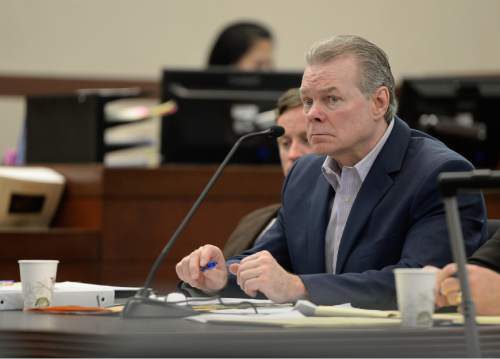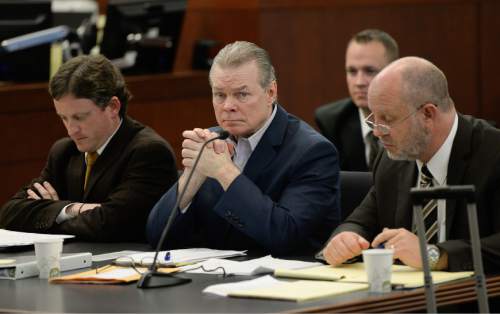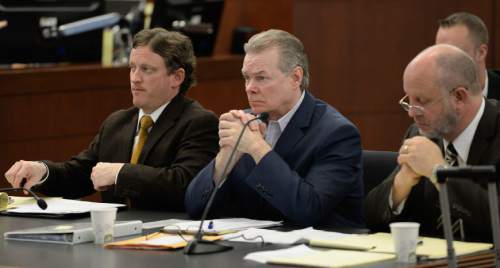This is an archived article that was published on sltrib.com in 2015, and information in the article may be outdated. It is provided only for personal research purposes and may not be reprinted.
Ogden • In an effort to convince a jury that Douglas Anderson Lovell should not be put to death for killing a woman in 1985, defense attorneys began their penalty phase case by calling a former religious volunteer at the prison who said he felt Lovell showed remorse for his crimes.
"He was very remorseful," John Newton told a 2nd District jury Monday. "He just felt bad for the victim's family. Who would not? They suffered a horrible tragedy in their life."
Newton said he first met Lovell in 2002 while volunteering in the Uinta 1 unit at the Utah State Prison. He never discussed the details of the murder with the prisoner, but instead talked about "fairly basic level" church teachings and answered Lovell's questions about the Bible and the Book of Mormon.
"He's always been very positive and looking ahead." Newton said. " … I admire him for what he has been able to do with his life, given the circumstances he finds himself in."
Defense attorneys also called several other Church of Jesus Christ of Latter-day Saints bishops, who through the years interacted with Lovell at the prison. The LDS leaders testified that Lovell was once an inactive member of the Utah-based faith and was officially excommunicated in 2011 as a result of his crimes.
A former bishop, Gary Webster, also testified that he felt Lovell showed remorse for the murder.
"He never made light," Webster said. "He never made fun. He was always concerned about the crime, the impact."
While under cross-examination, Webster acknowledged that the church leaders always talk to the prison inmates through a thick piece of glass, and added, "No man knows what's in another man's heart."
Last week, the 12-member jury found now-57-year-old Lovell guilty of aggravated murder for kidnapping and strangling Joyce Yost in 1985 to keep her from testifying against him in a rape case.
Jurors now must decide whether Lovell should be executed for the crime.
Lovell's defense attorneys did not contest Lovell's guilt in the 39-year-old woman's murder, saying they would instead focus on the mitigating factors in the case, including that Lovell suffered multiple head injuries as a child, as well as his family history, his model behavior as a prisoner and the low risk that he would reoffend.
Prosecutors rested their case Monday, after spending the morning focusing their witnesses on where Yost's body was left 30 years ago.
The woman's remains have never been found — despite multiple searches.
In 1993, Lovell tried to lead authorities to her body near Snowbasin ski resort — part of a plea deal in which prosecutors agreed not to seek his execution if Lovell could find the grave — but the search proved unsuccessful and Lovell was sentenced to death.
The Utah Supreme Court, however, ruled in 2010 that Lovell could withdraw his guilty plea because he should have been better informed of his rights during court hearings.
Weber County attorney's office investigator Shane Minor testified Monday that he talked to a prison inmate in 2006 who said Lovell confessed the murder to him and gave a different location for her burial.
"He said he at first had taken her to Snowbasin Road," Minor testified. "That's where he murdered her, was on that road. [Then he] moved her body and took it to Causey Reservoir."
The two locations are about 20 miles apart in the mountains east of Ogden Valley.
Prosecutors also pointed to Lovell's 1991 confession to his ex-wife, who was wearing a police recording device when she visited Lovell in prison. He told her he became nervous only once about someone finding Yost's body — when an anonymous tipster said he saw a body and a purse near Causey Reservoir in 1987. But the caller never gave his name or any specific information, and the police couldn't find the body.
Lovell also told his ex-wife in that 1991 recording that one day he might contact an attorney and confess where Yost's body was.
"I don't want to go through it in this way," he told her, according to a transcript read in court. "I want it on my terms."
The recordings led to Lovell being charged with Yost's murder in 1992.
"I premeditated," Lovell also told his ex-wife. "I planned to end Joyce's life … Capital murder is the worst thing you could do. Probably the death penalty."
Last week, Yost's two children and two of her grandchildren testified about how the woman's death had affected them.
Daughter Kim Salazar said her mother's death left her a "broken person." Salazar asked the jurors to remember that as Lovell pleads for his life at the sentencing phase, her mother "too asked for her life to be spared."
On Aug. 10, 1985, Lovell kidnapped Yost from her South Ogden apartment and took her to the mountains above Ogden, where he strangled her and hid her body.
Though Yost was missing when Lovell's rape case went to trial later in 1985, a transcript of her preliminary hearing testimony helped to convict him.
Prosecutors say that on the April night in 1985, when Lovell raped Yost, he had followed her home from a Clearfield restaurant and asked her out. When she declined to join the stranger for a drink, they say, he kidnapped her and sexually assaulted her.
For the rape, Lovell is serving a 15-years-to-life sentence in the Utah State Prison.







